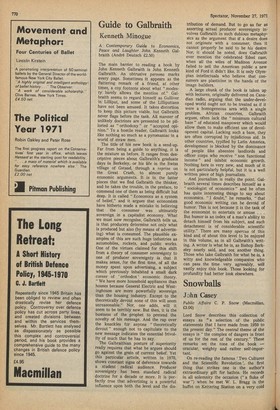Guide to Galbraith
Kenneth Minogue
A Contemporary Guide to Economics, Peace and Laughter John Kenneth Galbraith (Andre Deutsch £2.50) The main barrier to reading a book by John Kenneth Galbraith is John Kenneth Galbraith. An obtrusive persona marks every page. Sometimes it appears as the flattering remark of a friend, at other times, a coy footnote about what "modesty barely allows the mention of." Galbraith seems to regard himself as Gulliver in Lilliput, and some of the Lilliputians have not been amused. It takes distortion to keep this picture viable, but Galbraith never flags before the task. All manner of unlikely doctrines are presented to be pilloried as " orthodoxy " or "accepted opinion." To a hostile reader, Galbraith looks like nothing so much as a pyromaniac in a world of straw men.
The title of his new book is a send-up. Far from being a guide to anything, it is the mixture as before. It ranges from descriptive pieces about Galbraith's graduate days in Berkeley, or his life in the Swiss village of Gstaad, through a reprise on the Great Crash, to almost purely economic arguments. It is in the latter pieces that we find Galbraith the thinker, and he takes the trouble, 'in the preface, to commend one of them as being difficult but deep. It is called "Economics as a system of belief," and it argues that economists have hitherto made a mistake in believing that the consumer was ultimately sovereign in a capitalist economy. What we must now recognise, Galbraith tells us, is that producers determine not only what is produced but also (by means of advertising) what is consumed. The plausible examples of this are such huge industries as automobiles, rockets, and public works. One of the virtues claimed for this shift from a theory of consumer sovereignty to one of producer sovereignty is that it makes •sense, for the first time, of all the money spent upon advertising, a subject which previously inhabited a small dark corner of ' orthodox ' economic theory. "We have more household appliances than houses because General Electric and Westinghouse are more powerfully sovereign than the housing industry. Except to the theoretically devout none of this will seem unreasonable." Nor, one adds, will it seem to be terribly new. But then, it is the business of the prophet to pretend the novelty of his message. And the rap over the knuckles for anyone "theoretically devout" enough not to capitulate to the new message indicates the essential frivolity of much that he has to say.
The Galbraithian posture of superiority really requires that what he argues should go against the grain of current belief. Yet this particular article, written in 1970, shows constant signs of deference towards a student radical audience. Producer sovereignty has been standard radical doctrine for a decade or more. It is perfectly true that advertising is a powerful influence upon both the level and the dis tribution of demand. But to go as far as asserting actual producer sovereignty involves Galbraith in such dubious metaphysics as the argument that if a desire does not originate with a consumer, then it cannot properly be said to be his desire. Nor, it should be noted, does Galbraith ever mention the celebrated Edsel case, when all the wiles of Madison Avenue failed to sell the American public a new kind of Ford lit didn't like. It is only Olympian intellectuals who believe that consumers are plasticine in the hands of the image builders.
A large chunk of the book is taken up with (lectures, originally delivered on Canadian radio, arguing that the under-developed world ought not to be treated as if it were a homogeneous area with a single problem. African countries, Galbraith argues, often lack the "minimum cultural base" of educated manpower which would allow them to make efficient use of development capital. Lacking such a base, they are often corrupted by injudicious aid. In other countries, typified by Latin America, development is blocked by the dominance of people like absentee 'landlords and officer corps who receive "non functional income " and inhibit economic growth. Nothing here is very new, and much of it is not particularly helpful, but it is a well written piece of high journalism.
And journalism is really the point. Galbraith several times describes himself as a "sociologist of economics" and he often has quite interesting things to say about economics. "I doubt," he remarks, "that good economic writing can be devoid of humor. This is not because it is the task of the economist to entertain or amuse . . . But humor is an index of a man's ability to detach himself from his subject, and such detachment is of considerable scientific utility." There are many apercus of this kind and of about this level to be enjoyed in this volume, as in all Galbraith's writing. A writer is what he is, as Bishop Berkeley nearly said, and not another thing. Those who take Galbraith for what he is, a witty and knowledgeable companion who can pass the time very agreeably, will vastly enjoy this book. Those looking for profundity had better look elsewhere.














































 Previous page
Previous page